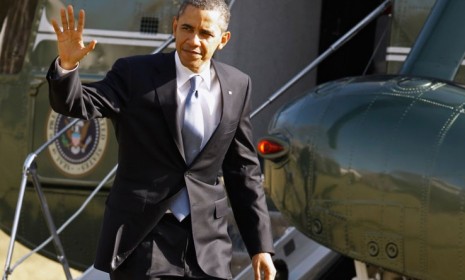Obama's upcoming visit to Korea's DMZ: 3 talking points
The president will make an appearance at one of "the most dangerous places on Earth" — just as North Korea escalates its aggressive rhetoric

A free daily email with the biggest news stories of the day – and the best features from TheWeek.com
You are now subscribed
Your newsletter sign-up was successful
The White House announced Wednesday that President Obama would, for the first time ever, visit the demilitarized zone (DMZ) between North and South Korea during his trip next week to Seoul, where he'll attend a nuclear security summit with other world leaders. The DMZ is among "the most dangerous places on Earth," says Voice of America, "with heavily armed North and South Korean forces aligned against one another." The two countries have been "in a formal state of war" for nearly 60 years. Further heightening tension, President Obama's trip comes as North Korea appears ready to launch a long-range rocket, a direct violation of its February promise to rein in its nuclear program. Here, three talking points:
1. This could make North Korea very angry
Obama's posture and itinerary is meant to "be a strong show of support for South Korea," say Alister Bull and Matt Spetalnick at Reuters. But North Korea — which just vowed to launch a rocket-mounted satellite, ignoring admonishments from international leaders — could very well see this as a provocation. Indeed, North Korea warned on Wednesday that any gripes about its nuclear program from visiting foreign leaders would be considered a "declaration of war."
The Week
Escape your echo chamber. Get the facts behind the news, plus analysis from multiple perspectives.

Sign up for The Week's Free Newsletters
From our morning news briefing to a weekly Good News Newsletter, get the best of The Week delivered directly to your inbox.
From our morning news briefing to a weekly Good News Newsletter, get the best of The Week delivered directly to your inbox.
2. Even China is worried
China is the closest thing North Korea has to an ally, but even Beijing has expressed "worry" over the planned rocket launch, says the BBC. China's deputy foreign minister has urged everyone to "stay calm and exercise restraint and avoid escalation of tension that may lead to a more complicated situation." Because North Korea is essentially a buffer between China and U.S.-backed South Korea, maintaining the paper-thin stability of the North is of utmost importance for other diplomatic relationships.
3. Sadly, this bluster may force starvation upon North Koreans
In February, North Korea reached an agreement with Washington to suspend nuclear tests, long-range missile launches, and uranium enrichment — all in exchange for hundreds of thousands of tons of food aid. The aid "was presented as a humanitarian gesture, not a quid pro quo," says Max Boot in Commentary, but the truth is, North Korea was expected to leave its nuclear ambitions behind. For Washington "to have any credibility, it must now announce that no food will be forthcoming. It's a shame that North Korea's long-suffering population must pay the price for its leaders' duplicity and aggression, but we have precious few other ways to hold this brutal regime to account."
A free daily email with the biggest news stories of the day – and the best features from TheWeek.com